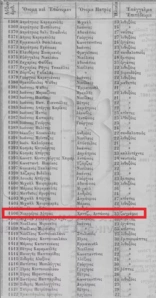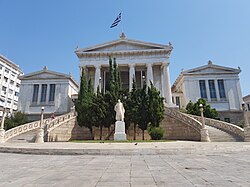
Greek archives play a vital role in preserving the rich historical, cultural, and social heritage of Greece. These repositories of knowledge and memory are not only essential for scholars and researchers but also for anyone interested in delving into the depths of Greece’s past. From ancient manuscripts to modern administrative documents, Greek archives offer a diverse range of materials that provide insights into the country’s evolution over the centuries.
Greece, with its rich historical and cultural heritage boasts a variety of archives that can be immensely helpful for genealogy research. These archives provide a wealth of information about ancestral connections, personal histories, and cultural contexts. This article will cover some of the key types of archives in Greece that are essential for genealogical research.
In recent years, digitization efforts have transformed the accessibility of Greek records. Many institutions have embarked on projects to digitize their collections, making them available online to researchers, students, and the general public. This democratization of access has broken down geographical barriers, allowing people from around the world to engage with Greece’s history and culture.
Research your ancestors on MyHeritage
Notable Greek archivesNotable Greek archives

National archives of Greece (GAS) / Greek state archives (GAK): The National Archives of Greece is located in Athens. It is one of the most famous and significant archives in Greece. Its impressive collection of documents dating back to the Ottoman period, the Greek War of Independence, and beyond. These records offer a glimpse into the political, economic, and National archives of Greece (GAS) / Greek state archives (GAK). The National Archives of Greece is located in Athens. It is one of the most famous and significant archives in Greece. Its impressive collection of documents dating back to the Ottoman period, the Greek War of Independence, and beyond. These records offer a glimpse into the political, economic, and social landscapes of Greece during pivotal moments in its history. Researchers can find letters, decrees, maps, and more, allowing them to piece together narratives that shed light on the struggles and triumphs of the Greek people. It serves as the primary repository for a vast collection of historical records, including vital records, land records, notary records, school records, electoral records, and more. These records provide valuable insights into family lineages and relationships, helping genealogists trace their roots back through generations.
State archives: Greece is divided into administrative regions, and each region typically has its own state archive. These archives preserve documents related to local administration, legal proceedings, and other official matters.
Municipal archives: Many Greek municipalities have their own archives, housing documents related to local governance, civic affairs, and residents. These archives may contain family registers, male birth registers, and other documents that shed light on the lives of your ancestors within specific communities.
Church archives: Given the deep religious traditions in Greece, church archives are invaluable for genealogy research. Parish registers, baptismal records, marriage records, and burial records maintained by Greek Orthodox churches offer vital information about family events and relationships.
Military archives: Military records offer a unique perspective on family history. Greece has a long history of military service, and archives hold documents related to conscription, military service and awards.
University libraries and research archives: Academic institutions in Greece often maintain specialized archives related to various fields of study. These archives can contain personal papers, scholarly research, and other documents that offer insights into your ancestors’ intellectual pursuits and contributions to society.
The Benaki museum archives: This collection focuses on art, culture, and social history. It houses a vast array of materials, including manuscripts, photographs, and audiovisual records. This archive enables researchers to explore Greece’s artistic and cultural evolution through the ages.

Village museums, libraries and local historical archives: Local historical groups play a crucial role in preserving community histories. They often collect oral histories, village history books, photographs, letters, and other materials that can provide a more personal and contextualized view of your ancestors’ lives.
Regional archives and libraries: Many regions in Greece have their own archives and libraries that hold collections of historical and cultural significance. These institutions may house manuscripts, maps, newspapers, and other records that can help genealogists better understand the context in which their ancestors lived.
In conclusion, Greek archives are integral to understanding the multifaceted tapestry of Greece’s history, culture, and society. These repositories of knowledge provide windows into the past, allowing us to learn from our ancestors, gain insights into the challenges they faced, and celebrate their achievements. As technology advances and awareness grows, these archives are poised to play an even greater role in shaping our understanding of Greece’s rich and diverse heritage.
See alsoSee also
Explore more about Greek archivesExplore more about Greek archives
- Greek record collections on MyHeritage
- MyHeritage Adds Three Historical Record Collections From Greece on the MyHeritage blog
- An Introduction to Tracing your Greek Ancestry at Legacy Family Tree Webinars
- Ask The Expert – New Greek Records on MyHeritage on the MyHeritage Knowledge Base
- Greece’s Top 5 Types of Genealogy Records at Legacy Family Tree Webinars
- Greek Diaspora Communities offer a wealth of articles and research links
- The Secret of Erikoussa: How MyHeritage Unearthed WWII Heroism - featured on the MyHeritage Blog

